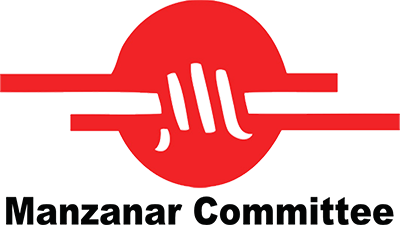Aiko Herzig-Yoshinaga, was seventeen years old when she was imprisoned at Manzanar and later, at Jerome and Rohwer, Arkansas.
After camp, she became a community and political activist, but is best-known for poring over tons of documents in the National Archives, discovering evidence that the United States Government perjured itself before the United States Supreme Court in the 1944 cases Korematsu v. United States, Hirabayashi v. United States, and Yasui v. United States which challenged the constitutionality of the imprisonment of Japanese Americans during World War II.
Herzig-Yoshinaga’s research uncovered evidence that the government had presented falsified evidence to the Court, destroyed evidence, and had withheld other vital information. This evidence provided the legal basis Japanese Americans needed to seek redress and reparations for their wartime imprisonment in American concentration camps.
Recently, she wrote a paper on the use of euphemistic language to describe these camps. Indeed, the US Government officially called them “relocation centers” during World War II. To this day, the debate rages on regarding what they should be called.
Now that the Manzanar National Historic Site has been established and is progressing in its work to educate the public about the experiences of those imprisoned there, efforts are also underway to protect, preserve and provide interpretive and educational resources for other Japanese American confinement sites such as the Minidoka National Historic Site, Tule Lake, Topaz, Amache, Heart Mountain, and more.
The National Park Service, which administers the Manzanar National Historic Site, Minidoka, Tule Lake and other sites, uses “relocation center” to refer to these camps. As such, a movement has begun to change that, and Herzig-Yoshinaga’s paper, “…is a personal story of how [her] consciousness about the uses and abuses of euphemistic terminology has evolved through the hard work and courage of many individuals from myriad backgrounds, both without and within the community of Nikkei (persons of Japanese ancestry). I am certainly not alone, nor among the first, to be concerned about the power of words to lie or clarify, and the need to identify and replace inaccurate and misleading euphemisms that were used by government officials at all levels and perpetuated by many Nikkei as well.”
To read (download) her insightful and well-researched paper, click on: Words Can Lie Or Clarify: Terminology Of The World War II Incarceration Of Japanese Americans by Aiko Herzig-Yoshinaga (requires Adobe Reader software to view/print).
The views expressed in this paper are those of the author and are not necessaily those of the Manzanar Committee.
LEAD PHOTO: Aiko Herzig-Yoshinaga. Photo: Gann Matsuda/Manzanar Committee.
Related Stories:
- Manzanar Committee Member Joyce Okazaki: “Yes, It Was A Concentration Camp”
- More From Okazaki On Use of “Concentration Camp;” Refutes Rafu Shimpo Columnist George Yoshinaga
- Grateful Crane’s Soji Kashiwagi Weighs In On Use Of “Concentration Camp”
- Sue Kunitomi Embrey: Concentration Camps, Not Relocation Centers
- Mako Nakagawa Delivers Keynote Address At 42nd Annual Manzanar Pilgrimage
- Euphemistic Terms Used To Describe WWII Incarceration Of Japanese Americans Targeted At JANM Event
- Cast in Bronze: Terminology Symposium in San Francisco, October 22, 2011
 The Manzanar Committee’s Official web site is licensed under a Creative Commons Attribution-NonCommercial-NoDerivs 3.0 Unported License. You may copy, distribute and/or transmit any story or audio content published on this site under the terms of this license, but only if proper attribution is indicated. The full name of the author and a link back to the original article on this site are required. Photographs, graphic images, and other content not specified are subject to additional restrictions. Additional information is available at: Manzanar Committee Official web site – Licensing and Copyright Information.
The Manzanar Committee’s Official web site is licensed under a Creative Commons Attribution-NonCommercial-NoDerivs 3.0 Unported License. You may copy, distribute and/or transmit any story or audio content published on this site under the terms of this license, but only if proper attribution is indicated. The full name of the author and a link back to the original article on this site are required. Photographs, graphic images, and other content not specified are subject to additional restrictions. Additional information is available at: Manzanar Committee Official web site – Licensing and Copyright Information.


